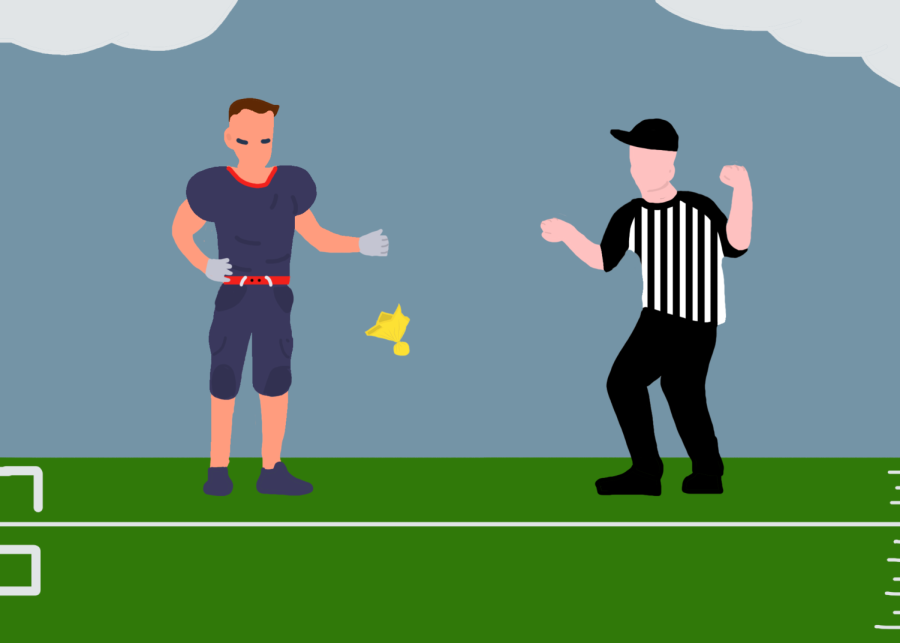Referees should be held to the same standard as players
With the recent rise in legalized sports betting through both traditional means, and newer experiences such as daily fantasy sports, the stakes of games have never been higher. Because of this, the actions of officials have come under increasing scrutiny.
November 30, 2021
In sports, we are taught a number of pillars that serve as the bedrock on which the rest of our knowledge in sports is built. Perhaps one of the most important things we are taught is the superiority of the referee. The referee’s word is not to be questioned, their judgment is final and you are to treat him with a certain level of respect not afforded to other members of the sports world. This attitude toward referees has been the expectation since sports began to professionally organize. Recent events, though, have led me to question if it is time for referees to be removed from their pedestal.
Referees are afforded a certain level of protection in sports, with one of the biggest being the protection from criticism. It is common in sports for things to follow a fairly routine pattern when referees are criticized. First, referees make a bad call in a game. Then, the coach in the heat of the moment after the game, makes some pointed comments criticizing the referee. Finally, the coach gets a fine in the mail in the next few days for criticizing the official. No matter how bad the call actually was, no matter what the effect of the call on the game, referees are completely insulated from criticism of any kind.
How is this fair in any way? When players have bad performances or coaches make terrible decisions, they are open to criticism. It is part of the job. We celebrate them when they do great, and we criticize them when they do poorly. However, with referees, there is no criticism allowed to them. In sports, we demand execution in all facets of the game; if you do not execute, criticism will follow. Unless you are a referee, in which case you are completely unaccountable. It is only fair that referees are fairly called out for mistakes that alter games’ outcomes since every other person involved in the game is open to that same criticism.
Another aspect of referees’ unique privilege in sports is their incredible job security. Referees in sports are usually supported by incredibly powerful unions. Often, referees are completely protected from losing their jobs. As an outside observer, there is one hard rule regarding referees: if they know your name as a referee, that is a bad thing. In Major League Baseball, for example, there are two umpires notorious for their poor performances, Joe West and Ángel Hernández. Notorious for terrible strike zones and calls that someone fresh off the street could make better, the two umpires have developed a reputation of being the worst in the business. Thanks to the power of their union, these two umpires have remained in their positions. In no other job in sports can you be that bad and face almost no prospect of termination, but referees and umpires enjoy that protection. Players and coaches are let go all of the time due to their subpar performance, referees should be no different.
Finally, it has long been the case that players cannot antagonize referees. Contacting an official in any sport leads to an immediate ejection, and this is a good thing to have. If this were not in place, it would be open season on referees making it a much more dangerous profession. What about when a referee antagonizes a player though? During a Monday night football game on Nov. 8, NFL referee Tony Corrente threw a flag on Chicago Bears defender Cassius Marsh for taunting. Really what happened was after taking a few steps toward the opposing team’s sideline after recording a sack, Marsh then began to return to his sideline. On his way back he crossed paths with Corrente who leaned his hip out to make contact with Marsh and then threw a flag on him. To make matters worse, despite clearly antagonizing Marsh in order to throw a flag against him, Corrente was not disciplined for the interaction. Instead, Marsh was given a fine. We punish players for contacting officials, but do not punish officials for contacting players on purpose? There is not much in the way of fairness there.
Furthermore, some officials have outright grudges against certain players. Such biases can’t exist when officiating a game at the highest level. NBA referee Scott Foster memorably has a long-held history with Chris Paul, in which Paul believes Foster has officiated his teams in an unfair and imbalanced manner. This is just one example of a purported grudge between referees and players that in any other profession would be seen as blatantly unprofessional. There is too much on the line for things like this to exist in professional sports and yet we do not hold referees to a higher standard.
It is time for referees to begin to meet the standards to which everyone else is held. Their institution exists as the one thing in sports above all reproach and it is time for this to change. It is time for us to begin to hold referees accountable for their performance and actions. As it stands right now, there is no incentive for referees to improve, as there is no one to hold them accountable. Only with that accountability will we be able to improve the quality of officiating in sports and preserve the integrity of the game going forward.








